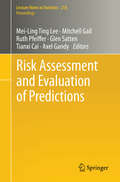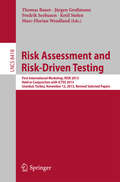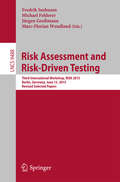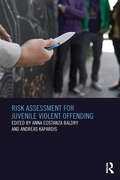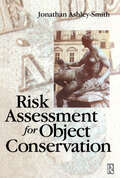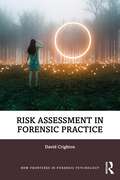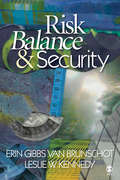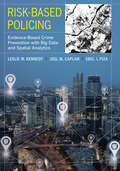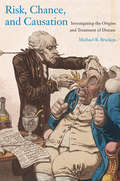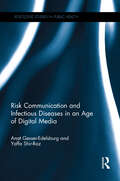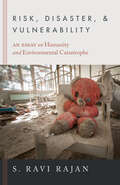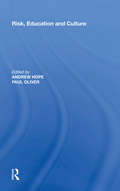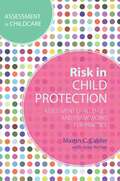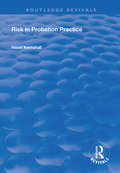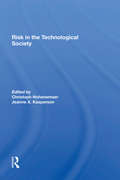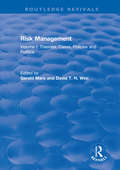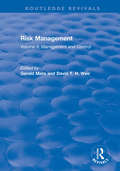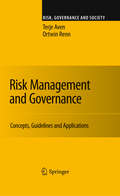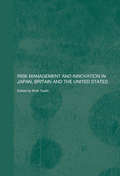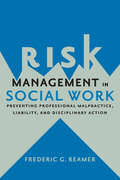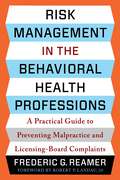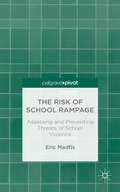- Table View
- List View
Risk Assessment and Evaluation of Predictions
by Mei-Ling Ting Lee Mitchell Gail Ruth Pfeiffer Glen Satten Tianxi Cai Axel GandyMethods of risk analysis and the outcome of particular evaluations and predictions are covered in detail in this proceedings volume, whose contributions are based on invited presentations from Professor Mei-Ling Ting Lee's 2011 symposium on Risk Analysis and the Evaluation of Predictions. This symposium was held at the University of Maryland in October of 2011. Risk analysis is the science of evaluating health, environmental, and engineering risks resulting from past, current, or anticipated, future activities. The use of these evaluations include to provide information for determining regulatory actions to limit risk, present scientific evidence in legal settings, evaluate products and potential liabilities within private organizations, resolve World Trade disputes amongst nations, and educate the public concerning particular risk issues. Risk analysis is an interdisciplinary science that relies on epidemiology and laboratory studies, collection of exposure and other field data, computer modeling, and related social, economic and communication considerations. In addition, social dimensions of risk are addressed by social scientists.
Risk Assessment and Risk-Driven Testing
by Thomas Bauer Jürgen Großmann Fredrik Seehusen Ketil Stølen Marc-Florian WendlandThis book constitutes the thoroughly refereed conference proceedings of the First International Workshop on Risk Assessment and Risk-driven Testing, RISK 2013, held in conjunction with 25th IFIP International Conference on Testing Software and Systems, ICTSS 2013, in Istanbul, Turkey, in November 2013. The revised full papers were carefully reviewed and selected from 13 submissions. The papers are organized in topical sections on risk analysis, risk modeling and risk-based testing.
Risk Assessment and Risk-Driven Testing
by Fredrik Seehusen Michael Felderer Jürgen Großmann Marc-Florian WendlandThis book constitutes the thoroughly refereed conferenceproceedings of the Third International Workshop on Risk Assessment andRisk-driven Testing, RISK 2015, held in conjunction with the OMG TechnicalMeeting in Berlin, Germany, in June 2015. The revised 8 full papers were carefully reviewed and selectedfrom 12 submissions. This workshop addresses systematic approaches that combinerisk assessment and testing. Also, the workshop was structured into the threesessions namely Risk Assessment, Risk and Development and Security Testing.
Risk Assessment for Juvenile Violent Offending
by Andreas Kapardis Anna Costanza BaldryThis volume is the result of an EU project involving two different European countries (Italy and Cyprus) on risk and needs assessment for juvenile violent offenders. The book is based on a longitudinal data base of juveniles who have committed violent crimes and who have been followed up after six months to measure their recidivism rate. The aim of this book is to provide practitioners who are dealing with juvenile (violent) offenders, with scientifically-based theories and knowledge derived from results about risk assessment. In particular it shows how a newly developed and tested instrument/approach, the EARN (European Assessment of Risk and Needs) works and how it can be used to help practitioners. Recidivism of violence in juveniles is based on several risk factors and is reduced on the basis of protective factors. Efficient legal intervention and treatment are more and more tailored according to the risk factors but also to the needs of juveniles. Juvenile Justice Systems in Europe tend to approach the juvenile who has committed a crime not only from a sanction point of view but more as an opportunity for the juvenile, his or her family and the social context in general, to reduce the risk of recidivism. This book will be of interest to researchers, students, social workers, police officers and lawyers.
Risk Assessment for Object Conservation
by Jonathan Ashley-Smith'Risk Assessment for Object Conservation' reflects Dr Jonathan Ashley-Smith's personal interests and views in areas including materials science, the ethics of restoration, the costs of conservation and the philosophy of museums. This valuable book explains the mechanisms of deterioration of museum artifacts, quantifying the probability that damage will occur and estimating the rate of progress when it does. The principles outlined and the information provided will form a foundation for cost-benefit analysis of conservation proposals. Dr Ashley-Smith also gives comprehensive explanations of scientific of mathematical material to take into consideration the readers who have no background in these areas, alongside a basic introduction. The structure of the book provides a logical progression through tools, concepts information and examples. This is a must-have purchase for all conservators, curators and administrators of historic artifacts at both student and professional level.
Risk Assessment in Forensic Practice (New Frontiers in Forensic Psychology)
by David CrightonRisk Assessment in Forensic Practice sets out a concise critical review of the way in which risk is assessed in current forensic practice. Setting the area in its historical context, this text outlines current practice in an accessible and clear format and discusses major critiques as well as the ways in which current practice might be developed to improve public protection. Providing an account of the main issues involved in risk and probability and the ways that these have been applied in practice, the book describes current forensic practice in relation to the dominant algorithmic and checklist-based methods. Critiques of these arising from social-legal, risk analysis and experimental psychology perspectives are summarised, and questions of the accuracy, fairness and lack of analysis are considered, along with the main challenges associated with making group and individual predictions of events. The text rejects the idea that clinical assessments of risk are generally ineffective and stresses the role of environmental context, training and expertise in improving practice. Through the author’s work in the field, this text also offers insight into the ways in which current practice might be improved and calls for greater analysis and methodological rigour. Risk Assessment in Forensic Practice appeals to a wide range of forensic practitioners including psychologists, psychiatrists, social workers, mental health nurses and lawyers. The text is also relevant to those involved in management and decision-making across forensic settings.
Risk Balance and Security
by Leslie W. Kennedy Dr Erin Gibbs Van BrunschotIn confronting risk, individuals and all agencies cannot simply respond with endless resources in mitigating the damage that hazards engender—they have to establish a balance. Risk Balance and Security combines the conceptual underpinnings of risk assessment and management at both the individual and agency level with a clear analysis of how these relate to challenges faced in responding to crime, terrorism, public health threats, and environmental disasters. With a new understanding of how decisions are made about threats and hazards, and how this understanding may be applied in our preparedness, prevention, and response strategies, we will be able to better conceptualize our task for enhancing security in the future.
Risk-Based Policing: Evidence-Based Crime Prevention with Big Data and Spatial Analytics
by Leslie W. Kennedy Joel M. Caplan Eric L. PizaRisk-based policing is a research advancement that improves public safety, and its applications prevent crime specifically by managing crime risks. In Risk-Based Policing, the authors analyze case studies from a variety of city agencies including Atlantic City, New Jersey; Colorado Springs, Colorado; Glendale, Arizona; Kansas City, Missouri; Newark, New Jersey; and others. They demonstrate how focusing police resources on risky places and basing police work on smart uses of data can address the worst effects of disorder and crime while improving community relations and public safety. Topics include the role of big data; the evolution of modern policing; dealing with high-risk targets; designing, implementing, and evaluating risk-based policing strategies; and the role of multiple stakeholders in risk-based policing. The book also demonstrates how risk terrain modeling can be extended to provide a comprehensive view of prevention and deterrence.
Risk, Chance, and Causation
by Michael B. BrackenThe press and other media constantly report news stories about dangerous chemicals in the environment, miracle cures, the safety of therapeutic treatments, and potential cancer-causing agents. But what exactly is actually meant by "increased risk"--should we worry if we are told that we are at twice the risk of developing an illness? And how do we interpret "reduced risk" to properly assess the benefits of noisily touted dietary supplements? Demonstrating the difficulty of separating the hype from the hypothesis, noted epidemiologist Michael Bracken clearly communicates how clinical epidemiology works. Using everyday terms, Bracken describes how professional scientists approach questions of disease causation and therapeutic efficacy to provide readers with the tools to help them understand whether warnings of environmental risk are truly warranted, or if claims of therapeutic benefit are justified.
Risk Communication and Infectious Diseases in an Age of Digital Media
by Anat Gesser-Edelsburg Yaffa Shir-RazIn a digital world where the public’s voice is growing increasingly strong, how can health experts best exert influence to contain the global spread of infectious diseases? Digital media sites provide an important source of health information, however are also powerful platforms for the public to air personal experiences and concerns. This has led to a growing phenomenon of civil skepticism towards health issues including Emerging Infectious Diseases and epidemics. Following the shift in the role of the public from recipients to a vocal entity, this book explores the different organizational strategies for communicating public health information and identifies common misconceptions that can inhibit effective communication with the public. Drawing on original research and a range of global case studies, this timely volume offers an important assessment of the complex dynamics at play in managing risk and informing public health decisions. Providing thought-provoking analysis of the implications for future health communication policy and practice, this book is primarily suitable for academics and graduate students interested in understanding how public health communication has changed. It may also be useful to health care professionals.
Risk, Disaster, and Vulnerability: An Essay on Humanity and Environmental Catastrophe
by S. Ravi RajanOver the course of the past century, there has been a sustained reflective engagement about environmental risks, disasters, and human vulnerability in our modern industrial world. This inquiry has raised a host of crucial questions. Just how safe is humanity in a world of toxic chemicals and industrial installations that have destructive potential? Is it feasible to prevent large-scale catastrophes like the ones in Bhopal, Chernobyl, and Fukushima and smaller-scale disasters such as oil spills and gas leaks? How do environmental hazards affect social and political orders? S. Ravi Rajan expertly synthesizes decades of public policy and academic discourse on how societies measure and ultimately come to terms with risk, danger, and vulnerability and offers a fresh, humanistic perspective for grappling with the new global scale and interconnectedness of these threats.
Risk, Education and Culture (Routledge Library Editions: Sociology Of Education Ser. #1)
by Andrew HopeIn recent years education has become increasingly perceived as an area of risk. A number of highly publicized incidents have heightened awareness of the potential dangers to be found in teaching institutions. Although there is now a substantial conceptual literature on risk and the meaning of the risk society, such ideas have not to date been rigorously applied to the educational sector. The authors of this innovative volume address this gap, discussing the relevance of risk discourses to educational processes. They recognize that risk discourses themselves (both academic and political) do not necessarily relate to actual dangers within education and they examine the differences between the risk narratives of expert and layperson, teacher and student, practitioner and academic. This book will greatly interest both sociologists and educationalists interested in the interaction between education and contemporary trends in society.
Risk in Child Protection: Assessment Challenges and Frameworks for Practice
by Julie Archer Martin C. CalderAssessing risk is a key challenge in child protection work. Martin C. Calder presents a clear and accessible guide to understanding risk and the part it plays. This book considers what risk means and how risk assessments should be defined, it outlines the key challenges practitioners face day-to-day, and offers a helpful evidence-based assessment framework for use by frontline staff. Calder argues that risk now has to be reconceived as a multi-disciplinary activity which stretches beyond social work. As such, he highlights a need for a clearer shared terminology among professionals and encourages the social work profession to look to related disciplines, such as criminal justice, for ideas to improve practice. Demystifying the complex debates around risk and showing how to deliver effective risk assessment, this is an essential reference for social workers and social work students, as well as lecturers.
Risk in Probation Practice (Routledge Revivals)
by Hazel KemshallFirst published in 1998, this volume examines risk in probation practice through consideration of the context, the risk differences and how to reconcile them. Hazel Kemshall responds to a recent crisis in the probation service of offenders committing crimes while on probation, prompting a re-evaluation of risk assessment of offenders with the potential for probation. The volume will be of interest to staff and managers involved in probation work.
Risk In The Technological Society
by Chris Hohenemser Jeanne X KaspersonIn this book, representatives of government, industry, universities, and public interest groups consider the emerging art of risk assessment and discuss the issues and problems involved. They look at two failures in technological risk management–Three Mile Island and Love Canal; examine the dimensions of technological risk; tackle the difficult question of how safe is "safe enough"; and offer a set of research priorities.
The Risk It Takes to Bloom: On Life and Liberation
by Raquel WillisA passionate, powerful memoir by a trailblazing Black transgender activist, tracing her life of transformation and her work towards collective liberation.In 2017, Raquel Willis took to the National Women’s March podium just after the presidential election of Donald Trump, primed to tell her story as a young Black transgender woman from the South. Despite having her speaking time cut short, the appearance only deepened her commitment to speaking up for communities on the margins.Born in Augusta, Georgia, to Black Catholic parents, Raquel spent years feeling isolated, even within a loving, close-knit family. There was little access to understanding what it meant to be queer and transgender. It wasn’t until she went to the University of Georgia that she found the LGBTQ+ community, fell in love, and explored her gender for the first time. But the unexpected death of her father forced her to examine her relationship with herself and those she loved. These years of grief, misunderstanding, and hard-won epiphanies seeped into the soil of her life, serving as fertilizer for growth and allowing her to bloom within.Upon graduation, Raquel entered a career in journalism against the backdrop of the burgeoning Movement for Black Lives, intersectional feminism going mainstream, and unprecedented visibility of the trans community. After hiding her identity as a newspaper reporter, her increasing awareness of the epidemic of violence plaguing trans women of color and the heightened suicide of trans teens inspired her to come out publicly. Within just a few short years of community organizing in Atlanta, Oakland, and New York, Raquel emerged as one of the most formidable Black trans activists in history.In The Risk It Takes to Bloom, Raquel Willis recounts with passion and candor her experiences straddling the Obama and Trump eras, the possibility of transformation after tragedy, and how complex moments can push us all to take necessary risks and bloom toward collective liberation.
Risk Management: Volume I: Theories, Cases, Policies and Politics (Routledge Revivals)
by Gerald Mars David T. WeirFirst published in 2000, Risk Management is a two volume set, comprised of the most significant and influential articles by the leading authorities in the studies of risk management. The volumes includes a full-length introduction from the editor, an internationally recognized expert, and provides an authoritative guide to the selection of essays chosen, and to the wider field itself. The collections of essays are both international and interdisciplinary in scope and provide an entry point for investigating the myriad of study within the discipline.
Risk Management: Volume II: Management and Control (Routledge Revivals)
by Gerald Mars David T. WeirFirst published in 2000, Risk Management is a two volume set, comprised of the most significant and influential articles by the leading authorities in the studies of risk management. The volumes includes a full-length introduction from the editor, an internationally recognized expert, and provides an authoritative guide to the selection of essays chosen, and to the wider field itself. The collections of essays are both international and interdisciplinary in scope and provide an entry point for investigating the myriad of study within the discipline.
Risk Management and Governance: Concepts, Guidelines and Applications
by Ortwin Renn Terje AvenRisk is a popular topic in many sciences - in natural, medical, statistical, engineering, social, economic and legal disciplines. Yet, no single discipline can grasp the full meaning of risk. Investigating risk requires a multidisciplinary approach. The authors, coming from two very different disciplinary traditions, meet this challenge by building bridges between the engineering, the statistical and the social science perspectives. The book provides a comprehensive, accessible and concise guide to risk assessment, management and governance. A basic pillar for the book is the risk governance framework proposed by the International Risk Governance Council (IRGC). This framework offers a comprehensive means of integrating risk identification, assessment, management and communication. The authors develop and explain new insights and add substance to the various elements of the framework. The theoretical analysis is illustrated by several examples from different areas of applications.
Risk Management and Innovation in Japan, Britain and the USA (Routledge Studies in the Growth Economies of Asia #Vol. 1)
by Ruth TaplinAssessing and managing risk is vitally important, and is increasingly studied in a range of areas including politics and international relations, finance and insurance, and innovation and the valuing of intangible assets such as patents and intellectual property. The degree to which innovation is encouraged or otherwise – a key factor for many businesses - depends in part on the attitude towards risk in the context in which it takes place. Taplin considers the different attitudes towards risk and innovation, and the different ways in which risk and innovation are handled, in Japan, Britain the USA. Providing a broad and detailed examination of the subject, she discusses topics including risk management standards, managing risk in marketing, the insurance industry, patents, and in venture capital, and of how risk management in organizations has evolved.
Risk Management in Social Work: Preventing Professional Malpractice, Liability, and Disciplinary Action
by Frederic G. ReamerThis new text is based on Frederic G. Reamer's key reference for practitioners, Social Work Malpractice and Liability: Strategies for Prevention. Rooted in his own experiences as an expert witness in court and licensing board cases, the volume introduces the concepts of negligence, malpractice, and liability before turning to the subject of risk management. Reflecting on recent legal cases and research, Reamer identifies a variety of problems in the social work field relating to privacy and confidentiality, improper treatment and delivery of services, impaired practitioners, supervision, consultations and referrals, fraud and deception, and termination of service. He also explores the unprecedented ethical challenges created by new digital technologies—such as online counseling, video counseling, and practitioners' use of social networks and social media—and describes current issues relating to HIPAA compliance and access to electronic health records (EHR) and health information exchanges (HIE).He concludes with practical suggestions for social workers named as defendants in lawsuits and respondents in licensing board complaints.
Risk Management in Social Work
by Frederic G. ReamerIntroduces the concepts of negligence, malpractice, and liability before turning to the subject of risk management
Risk Management in the Behavioral Health Professions: A Practical Guide to Preventing Malpractice and Licensing-Board Complaints
by Frederic G. ReamerRisk Management in the Behavioral Health Professions is a comprehensive handbook for mental health and social service providers on prevention of malpractice lawsuits and licensing-board complaints. Frederic G. Reamer draws on his extensive firsthand experience as an expert witness in litigation and licensing-board cases throughout the United States to give readers an insider’s view of practical risk-management strategies. He provides in-depth discussion of common risk areas and steps practitioners can take to protect clients and themselves.Key topics include confidentiality and privileged communication; service delivery, including informed consent, assessment, boundary issues, suicide risk management, and use of technology; impaired practitioners; supervision and consultation; documentation; deception and fraud; and interruption and termination of services. Reamer offers pragmatic advice about how to respond to a lawsuit or licensing-board complaint. He emphasizes the challenges and risks related to remote service provision, especially during public health crises and pandemics. The book includes sample risk-management forms and templates as well as extensive case examples that illustrate fundamental risk-management concepts.Designed for behavioral health professionals including social workers, psychologists, mental health counselors, marriage and family therapists, psychiatrists, and substance use disorder treatment counselors, this book is an indispensable resource on how to navigate challenging ethics and risk-management issues.
Risk Management Strategies of Japanese Companies in China: Political Crisis and Multinational Firms (Politics in Asia)
by Kristin VekasiIn the context of political tensions and rising economic interdependence between Japan and China, this book studies how Japanese multinational companies try to minimize damages and manage their own fear and uncertainty to sustain their business interests. Using a qualitative approach, including over 150 interviews with Japanese and Chinese business and industry leaders, combined with statistical analysis of unique firm-level data, this book brings a ‘firm-level view’ to this crucial case of political conflict amid economic interdependence. It argues that there is wide variation in the degree of material damages Japanese multinationals sustain in the aftermath of political disputes, and how threatening they perceive the risks of political conflict to be. This book then goes on to evaluate the different responses to risk, from promoting Japan's culture through privately funded tactics and building common cause with the government, to diversifying a portion of assets abroad and even leaving China entirely. Presenting a new angle on economic globalization in the Asia Pacific region, Risk Management Strategies of Japanese Companies in China will be useful to students and scholars of Asian politics, business, and economics as well as international political economy.
The Risk of School Rampage: Assessing and Preventing Threats of School Violence
by Eric MadfisBy examining averted school rampage incidents, this work addresses problematic gaps in school violence scholarship and advances existing knowledge about mass murder, violence prevention, bystander intervention, threat assessment, and disciplinary policy in school contexts.
